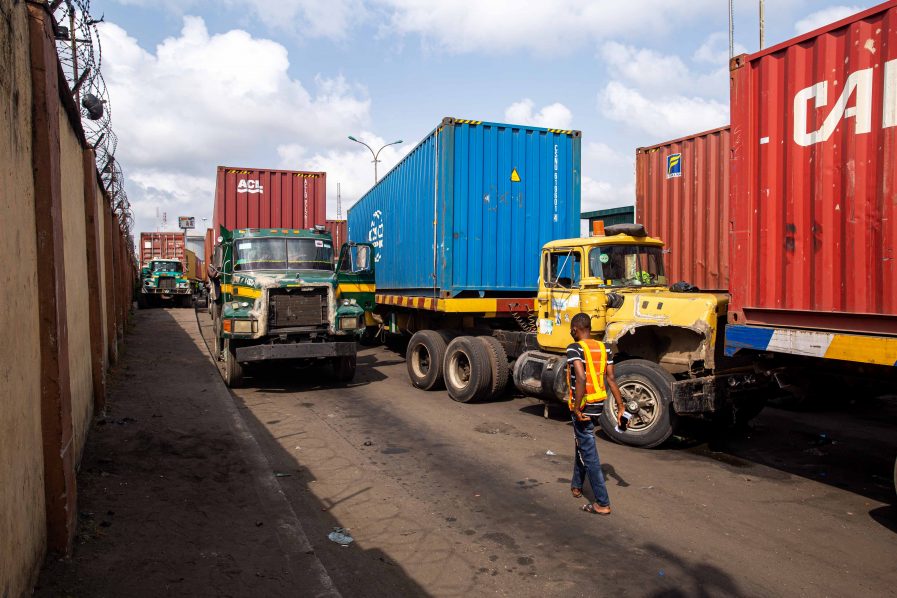
After oil, the port of Lagos, which stretches from Apapa to Tin Can island, is the second largest source of income for the African giant.
Yet Nigeria loses about $55 million a day due to congestion in its ports, according to the specialist research firm Dynanmar, and has been overtaken by Togo, a country with a population of 8 million, as the leading container port in West Africa. (Photo by Benson Ibeabuchi / AFP)
The Nigerian Ports Authority (NPA) yesterday attributed its decision to temporarily suspend all export receipts at the Lagos Ports Complex and the Tin Can Island Port till April 5, 2021, to the need to clear the congestion resulting from over 800 export cargoes lying at the port corridors.
According to the NPA, it has become expedient to address the backlog before adding new trucks to end congestion on port access roads and improve service delivery through its electronic call-up system.
It noted that as of yesterday, NPA could not add more cargoes while the ones that had already been ticketed were yet to access the ports, thus undermining the call-up system.
With the decision impacting export business and potential revenue to the country, the Nigerian Export Promotion Council (NEPC) urged stakeholders to explore solutions that would reduce the challenges faced by exporters in moving their goods/cargoes from the hinterland to ports.
The Director/CEO of the Nigerian Export Promotion Council (NEPC), Olusegun Awolowo, at a stakeholders’ interactive session to fast-track export cargo containers access into Lagos ports held yesterday, expressed concerns about the gridlock at the ports due to cargo congestion, describing it as a recurring challenge.
“On the heels of this, are constant complaints from exporters on losses incurred due to over-delay of consignments, which at times rendered the products concerned as unwholesome and subsequently leading to product rejects. This has made export from Nigeria uncompetitive in comparison to exports from other countries”, he said.
He added that the NEPC is collaborating with other stakeholders on the concept of domestic export warehouse and export aggregation centres to serve as a one-stop facility/terminal for receipt of products, packaging/labelling, pre-shipment inspection, and fumigation of goods ultimate transportation of consignments to the ports.
According to him, the Federal Government has been making frantic efforts on approaches to ensure that export business is seamless and devoid of encumbrances that can make export business in Nigeria a nightmare.
Managing Director of NPA, Hadiza Bala Usman urged operators to utilise other ports for exports, adding that cargoes should be linked to ports of a destination rather than congesting a particular port.
“There has been a challenge and congestion at the port area. We are trying to categorise cargoes. As of Sunday, we had 823 trucks of export cargoes that have been ticketed, have their e-call up, and waiting to enter the ports. Some of them were already at Lilypond and a significant portion on the road. We advise that cargoes should be kept at the premises of their owners and should be well preserved. Even if we allow you with tickets, you will be on the roads and not allowed access to the ports. Would you rather be on the road without control of your cargoes?
“We need to be pragmatic in our decisions. That was what informed our decision to suspend export receipts at both ports and all satellite truck parks, since Monday. The data around e-call up has helped to demystify the process. The processes for certification are also cumbersome and create bottlenecks for exports. This is why the exporter needs to know the processes.
“NIWA is also exploring ways to ensure that some cargoes are moved via barges on inland waters. Inland waters should be explored and made commercially viable for everyone to use. We need to discourage the use of roads as the only option for the movement of goods into the ports”, she added.



